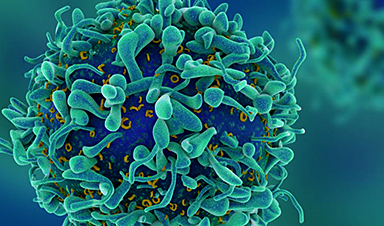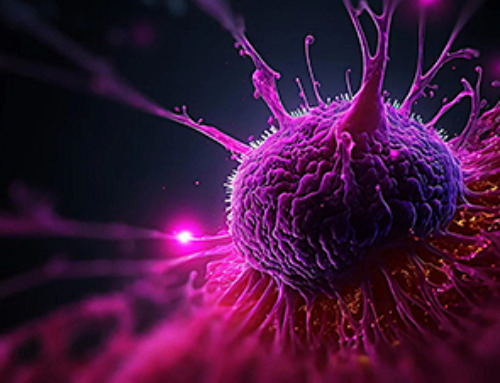Artificial Intelligence has helped scientists reveal a new form of aggressive prostate cancer, which could revolutionise how the disease is diagnosed and treated in the future.
A Cancer Research UK-funded study, published in Cell Genomics, has revealed that prostate cancer, which affects one in eight men in their lifetime, includes two different subtypes termed evotypes.
The discovery was made by an international team led by the University of Oxford, and The University of Manchester, who applied AI (artificial intelligence) on data from DNA to identify two different subtypes affecting the prostate.
The team hope their findings could save thousands of lives in future and revolutionise how prostate cancer is diagnosed and treated. Ultimately, it could provide tailored treatments to each individual patient according to a genetic test which will also be delivered using AI.
The ground-breaking research, which involved additional funding from Prostate Cancer Research and involved scientists from the University of Oxford, the University of Manchester, the University of East Anglia and the Institute of Cancer Research, London, highlights how a prostate cancer diagnosis can affect physical, emotional and mental wellbeing.
Lead researcher Dr Dan Woodcock, of the Nuffield Department of Surgical Sciences at the University of Oxford, said: ‘Our research demonstrates that prostate tumours evolve along multiple pathways, leading to two distinct disease types. This understanding is pivotal as it allows us to classify tumours based on how the cancer evolves rather than solely on individual gene mutations or expression patterns.’
The researchers worked together as part of international consortium, called The Pan Prostate Cancer Group, set up by scientists at The Institute of Cancer Research (ICR) and The University of East Anglia to analyse genetic data from thousands of prostate cancer samples across nine countries.
Crucially, the team’s collaboration with Cancer Research UK (CRUK) aims to develop a genetic test that, when combined with conventional staging and grading, can provide a more precise prognosis for each patient, allowing tailored treatment decisions.
The researchers used AI to study changes in the DNA of prostate cancer samples (using whole genome sequencing) from 159 patients.
They identified two distinct cancer groups among these patients using an AI technique called neural networks. These two groups were confirmed by using two other mathematical approaches applied to different aspects of the data. This finding was validated in other independent datasets from Canada and Australia.
They went on to integrate all the information to generate an evolutionary tree showing how the two subtypes of prostate cancer develop, ultimately converging into two distinct disease types termed ‘evotypes’.
Dr Rupal Mistry, CRUK’s senior Science Engagement Manager, said: ‘The work published today by this global consortium of researchers has the potential to make a real difference to people affected by prostate cancer. The more we understand about cancer the better chance we have of developing treatments to beat it. We are proud to have helped fund this cutting-edge work, which has laid the foundations for personalised treatments for people with prostate cancer, allowing more people to beat their disease.’
The paper ‘Genomic evolution shapes prostate cancer disease type‘ is published in Cell Genomics.
News
NanoMedical Brain/Cloud Interface – Explorations and Implications. A new book from Frank Boehm
New book from Frank Boehm, NanoappsMedical Inc Founder: This book explores the future hypothetical possibility that the cerebral cortex of the human brain might be seamlessly, safely, and securely connected with the Cloud via [...]
Deadly Pancreatic Cancer Found To “Wire Itself” Into the Body’s Nerves
A newly discovered link between pancreatic cancer and neural signaling reveals a promising drug target that slows tumor growth by blocking glutamate uptake. Pancreatic cancer is among the most deadly cancers, and scientists are [...]
This Simple Brain Exercise May Protect Against Dementia for 20 Years
A long-running study following thousands of older adults suggests that a relatively brief period of targeted brain training may have effects that last decades. Starting in the late 1990s, close to 3,000 older adults [...]
Scientists Crack a 50-Year Tissue Mystery With Major Cancer Implications
Researchers have resolved a 50-year-old scientific mystery by identifying the molecular mechanism that allows tissues to regenerate after severe damage. The discovery could help guide future treatments aimed at reducing the risk of cancer [...]
This New Blood Test Can Detect Cancer Before Tumors Appear
A new CRISPR-powered light sensor can detect the faintest whispers of cancer in a single drop of blood. Scientists have created an advanced light-based sensor capable of identifying extremely small amounts of cancer biomarkers [...]
Blindness Breakthrough? This Snail Regrows Eyes in 30 Days
A snail that regrows its eyes may hold the genetic clues to restoring human sight. Human eyes are intricate organs that cannot regrow once damaged. Surprisingly, they share key structural features with the eyes [...]
This Is Why the Same Virus Hits People So Differently
Scientists have mapped how genetics and life experiences leave lasting epigenetic marks on immune cells. The discovery helps explain why people respond so differently to the same infections and could lead to more personalized [...]
Rejuvenating neurons restores learning and memory in mice
EPFL scientists report that briefly switching on three “reprogramming” genes in a small set of memory-trace neurons restored memory in aged mice and in mouse models of Alzheimer’s disease to level of healthy young [...]
New book from Nanoappsmedical Inc. – Global Health Care Equivalency
A new book by Frank Boehm, NanoappsMedical Inc. Founder. This groundbreaking volume explores the vision of a Global Health Care Equivalency (GHCE) system powered by artificial intelligence and quantum computing technologies, operating on secure [...]
New Molecule Blocks Deadliest Brain Cancer at Its Genetic Root
Researchers have identified a molecule that disrupts a critical gene in glioblastoma. Scientists at the UVA Comprehensive Cancer Center say they have found a small molecule that can shut down a gene tied to glioblastoma, a [...]
Scientists Finally Solve a 30-Year-Old Cancer Mystery Hidden in Rye Pollen
Nearly 30 years after rye pollen molecules were shown to slow tumor growth in animals, scientists have finally determined their exact three-dimensional structures. Nearly 30 years ago, researchers noticed something surprising in rye pollen: [...]
How lipid nanoparticles carrying vaccines release their cargo
A study from FAU has shown that lipid nanoparticles restructure their membrane significantly after being absorbed into a cell and ending up in an acidic environment. Vaccines and other medicines are often packed in [...]
New book from NanoappsMedical Inc – Molecular Manufacturing: The Future of Nanomedicine
This book explores the revolutionary potential of atomically precise manufacturing technologies to transform global healthcare, as well as practically every other sector across society. This forward-thinking volume examines how envisaged Factory@Home systems might enable the cost-effective [...]
A Virus Designed in the Lab Could Help Defeat Antibiotic Resistance
Scientists can now design bacteria-killing viruses from DNA, opening a faster path to fighting superbugs. Bacteriophages have been used as treatments for bacterial infections for more than a century. Interest in these viruses is rising [...]
Sleep Deprivation Triggers a Strange Brain Cleanup
When you don’t sleep enough, your brain may clean itself at the exact moment you need it to think. Most people recognize the sensation. After a night of inadequate sleep, staying focused becomes harder [...]
Lab-grown corticospinal neurons offer new models for ALS and spinal injuries
Researchers have developed a way to grow a highly specialized subset of brain nerve cells that are involved in motor neuron disease and damaged in spinal injuries. Their study, published today in eLife as the final [...]





















